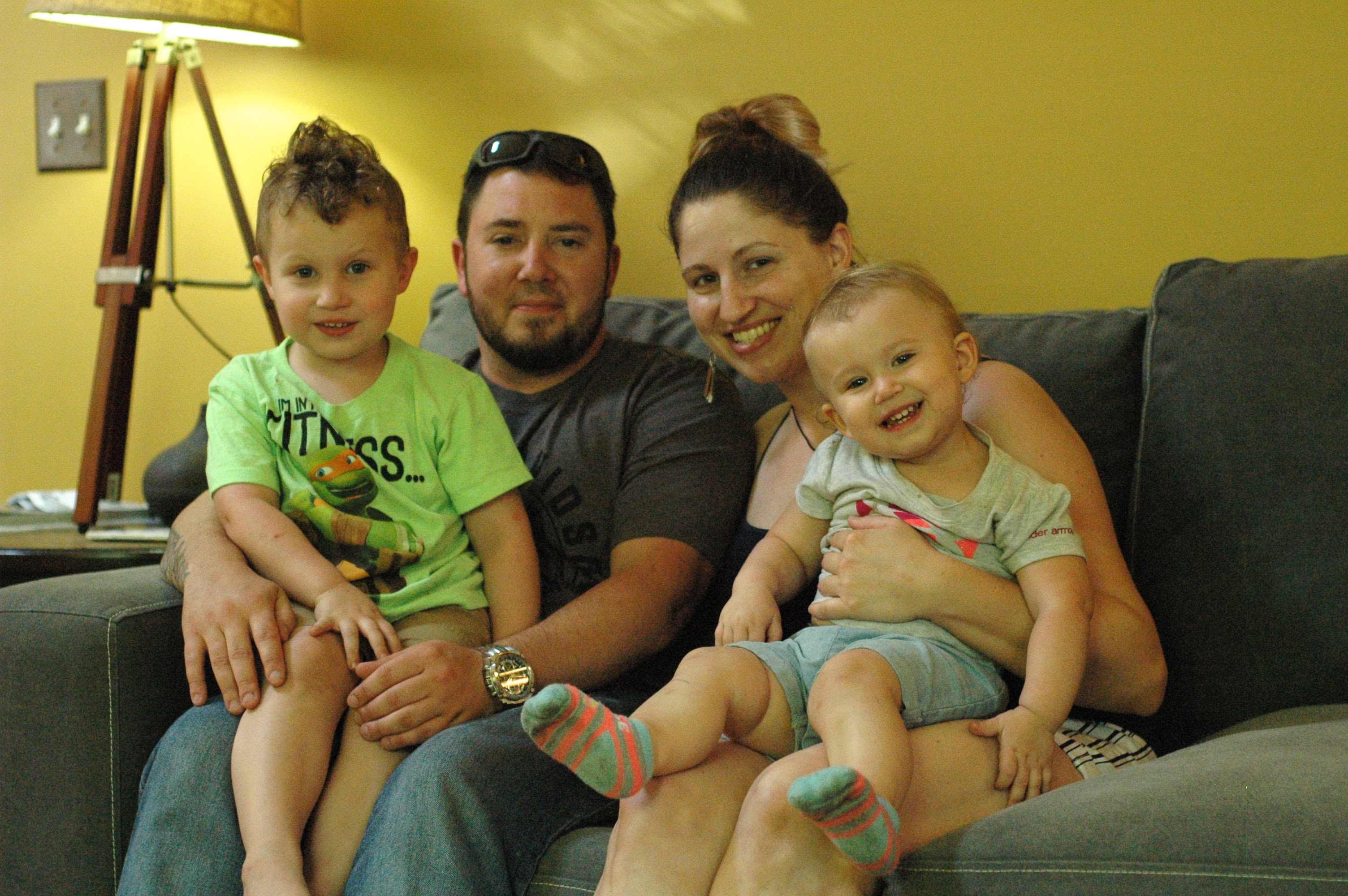Community class helps fathers become better dads
Healthy Dads classes provided at jail, homeless shelter and to community members

Chance Smith, 31, is pictured with his family at their Lawrence home on Friday, June 16, 2017. From left are his son Liam Smith, 3, wife Megan Smith and daughter Autumn Smith, 1.
Patience.
It’s never been one of Chance Smith’s strengths. But with a 1-year-old daughter and 4-year-old son, the Lawrence dad said, he’s realized it’s time for that to change.
“To be a father,” he said, “you’ve got to have a lot of patience.”
That’s been one of the most important lessons Chance, 31, took home from the Healthy Dads Healthy Families program offered by the Lawrence-Douglas County Health Department.
He’s one of a couple hundred dads who participated in classes offered by the program, which is wrapping up its first year, according to program coordinator Jery Márquez. Márquez teaches weekly classes for dads — and other father figures — in the Douglas County jail, the Lawrence Community Shelter and in the community.
The program’s curriculum runs for seven weeks and then repeats, Márquez said, but with the exception of some men who are ordered by the courts to participate, it’s optional and some men come on a drop-in basis or keep coming and repeating classes even after “graduating” from the course.
“The class is open for any dad or father figure,” Márquez said. “It can be for the uncle, the grandpa…any step dad obviously. Any man who has a role or impact on children’s lives is able to come to the class.”

Chance Smith, 31, is pictured with his family at their Lawrence home on Friday, June 16, 2017. From left are his son Liam Smith, 3, wife Megan Smith and daughter Autumn Smith, 1.
In Chance’s case, he participated in the community classes starting earlier this year. And his participation wasn’t ordered by the courts — it was ordered by his wife.
At the end of last year, Megan Smith and the kids had moved out.
In 2015, Chance sustained a head injury on the job that left him critically injured, hospitalized for about two months and dealing with permanent effects of a traumatic brain injury. He relies on a number of medications to survive and regulate functions controlled by parts of his brain that were injured.
He said he went from working 10-hour days, six days a week to suddenly being a stay-at-home dad, while his wife went to work instead.
“I always kind of belittled her a little bit for her role at the house,” he said, “until I realized…”
Chance and Megan said that when she moved out, Chance had been depressed, drinking and abusing drugs, and that Megan feared for her and the children’s safety.
Megan’s goal was to move back, but not only did Chance need to get his own problems under control first, he needed to learn how to function as a husband and dad.
She’d heard about the Healthy Dads program, and made it one of her stipulations for moving back in.
“The ultimate goal was to come back home — with a change,” she said. “Because he loves us, he’s got a good heart, but there are these other things.”
The classes were a game-changer, the couple said.
“It’s made a happier home, for sure,” Megan said.
Márquez cites staggering statistics about the correlation between fatherless homes and problems like dropping out of school, teen pregnancy, drug and alcohol abuse, runaways, bullying and, eventually, incarceration.
Some fathers he sees in Healthy Dads have criminal histories or addictions, Márquez said. Sometimes they have protective mothers keeping them away from their children, rightfully or not. Many lacked father figures in their own childhoods. Situations vary.
“That is not an excuse, but it’s a way to understand where they’re coming from,” Márquez said. “Some dads kind of need a little lift and encouragement and empowerment.”

Jery Márquez is pictured leading a class at the Douglas County jail in June 2017. Márquez is coordinator of the Healthy Dads Healthy Families program offered by the Lawrence-Douglas County Health Department.
In addition to teaching men healthy parenting, discipline and communication techniques, the Healthy Dads program aims to be a supportive space, Márquez said.
“We don’t judge them for choices they have made,” he said. “It’s like, your children need you, you need your children, let’s support each other.”
While neither of them had a bad upbringing, Megan said her parents divorced when she was young and that Chance’s dad, who was in the military, was overseas and away from the family a lot.
“We didn’t have much of a model growing up…how do we raise kids together?” she said. “The Healthy Dads program, I think, was a huge stepping stone.”
In addition to the importance of patience, Chance said the classes helped him understand how impressionable his kids are. At 1 and 4, “all your words and actions, they’re going to soak in,” he said.
He also realized his wants and needs don’t come before his children’s needs, he said, and that instilling values including love, honesty, integrity and resiliency in them is one of the most important things a dad can do.
Chance, holding up his course completion certificate as his kids clambered over him on the living room couch last week, said he hopes to keep going back.
“Every time I would go and come back home it makes you feel refreshed,” he said. “There’s no perfect parent — there’s not. But that class helps you get a little bit closer.”
Learn more about the Healthy Dads Healthy Families program online at ldchealth.org/391/Healthy-Dads.







